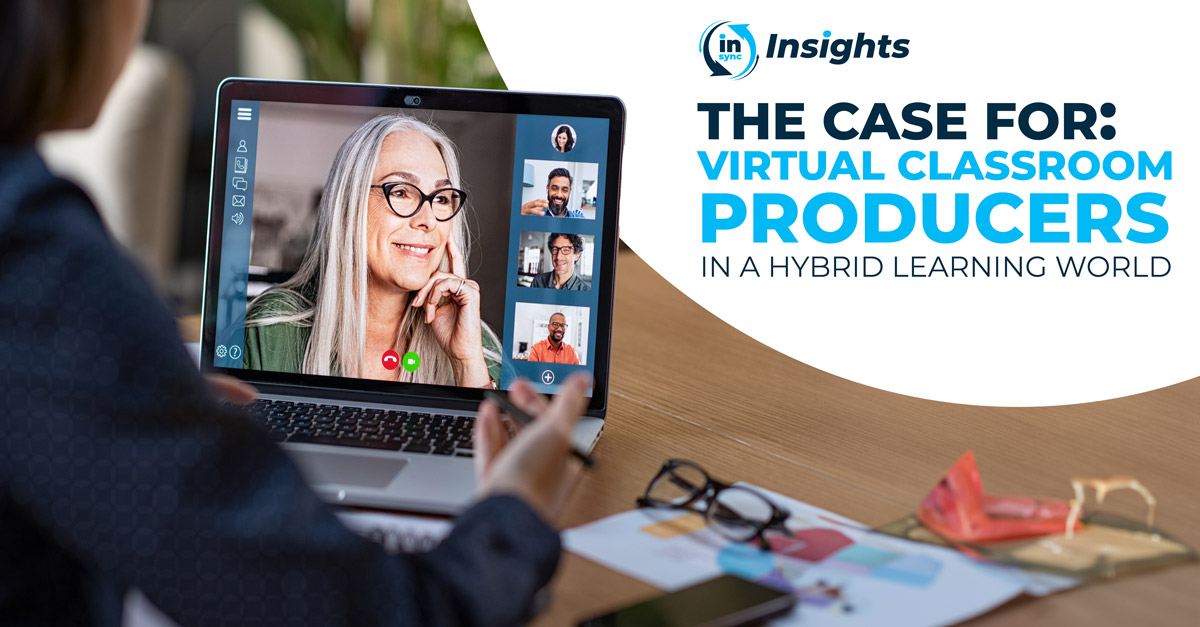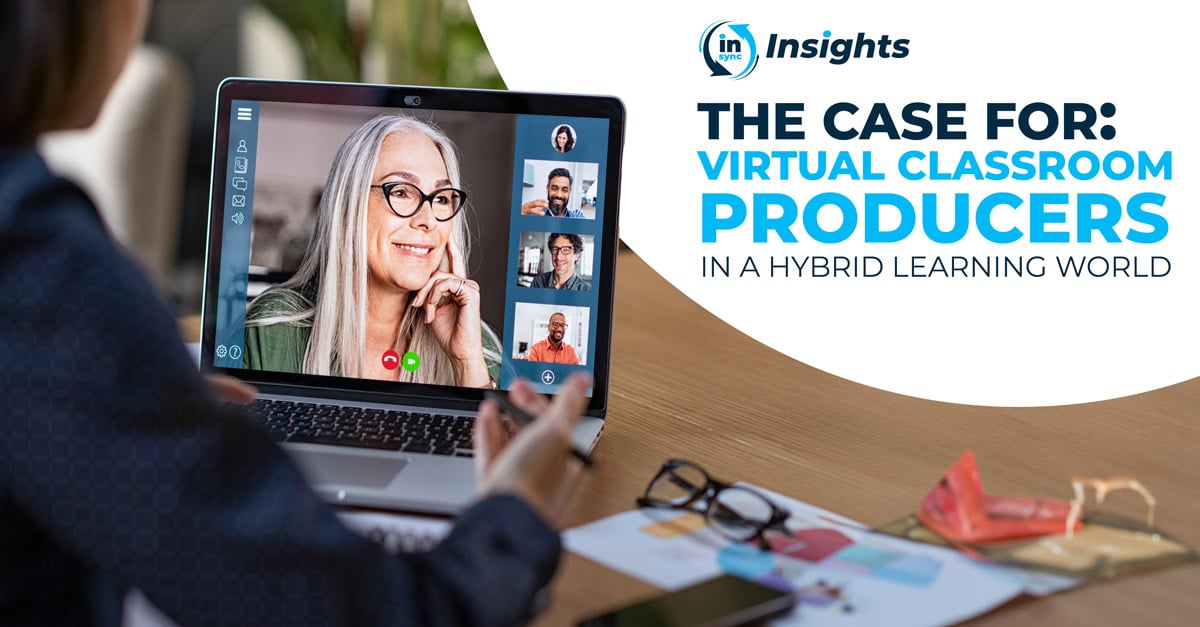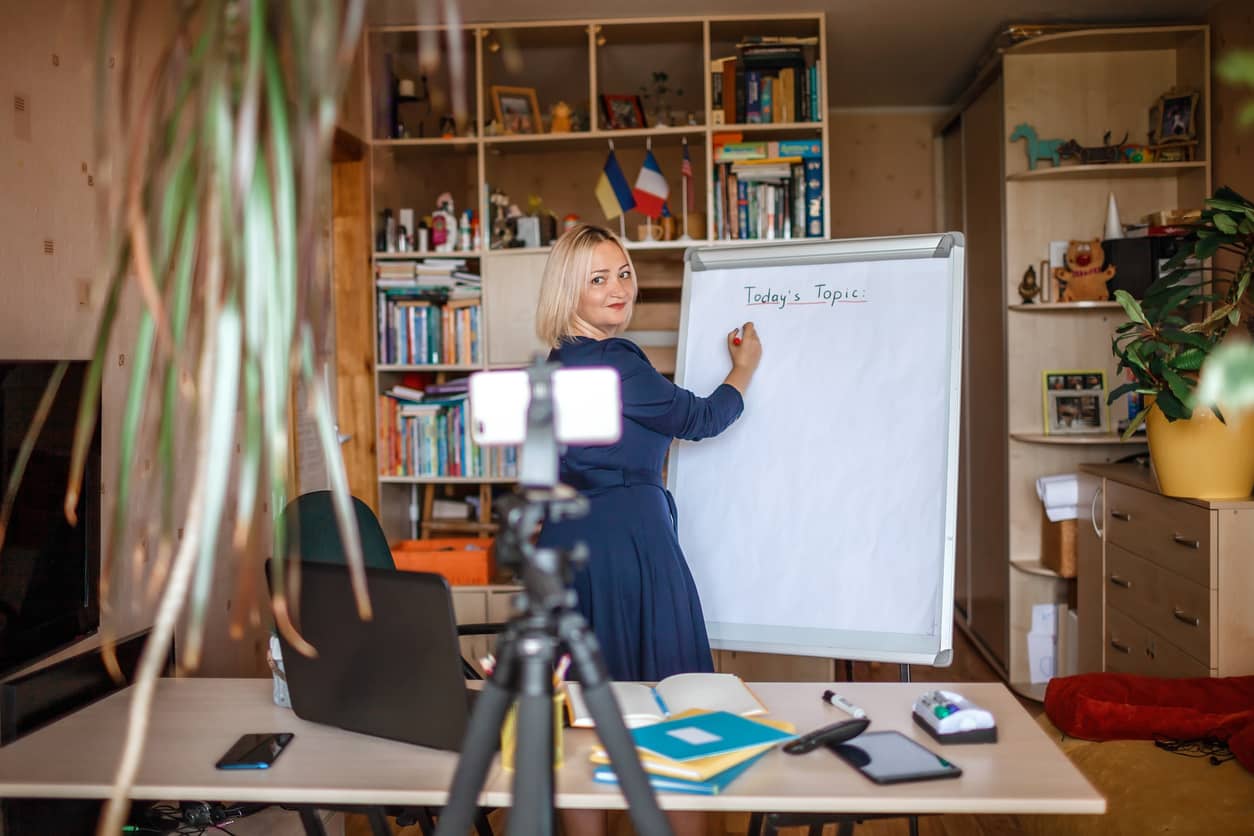Best Approaches to Hybrid Learning So No Learner is Left Behind
We all know that the learning environment has vastly changed as a result of the pandemic. Hybrid learning, combining virtual with face-to-face...
6 min read
 Jennifer Hofmann
:
Oct 11, 2023 11:29:08 AM
Jennifer Hofmann
:
Oct 11, 2023 11:29:08 AM

Pre-pandemic, it was a common perception that more rigorous training programs required an in-person classroom experience. Now, with years of experience proving that much of this content can be taught effectively in a virtual environment, training programs are being designed for virtual and hybrid delivery first.
Strong arguments need to be made to justify in-person classes, especially those that include travel related expenses. There are, of course, strong arguments to be made for some face-to-face programs, especially where collaboration and community building are critical.
In an era where virtual classrooms have become the new normal, the role of Virtual Classroom Producers has never been more crucial. These professionals play a pivotal part in the successful execution of virtual learning, both offering technical support and maintaining the rhythm of live instruction.

In today's rapidly evolving digital landscape, the significant shift toward a hybrid workforce has further highlighted the importance of virtual training. As organizations strive to bridge the gap between remote and in-person employees, virtual classrooms have emerged as a powerful tool for providing consistent, high-quality training. Amid this transformation, the role of Virtual Classroom Producers has become more critical than ever before.
In a hybrid workforce, creating a sense of unity and fostering community can be challenging. However, Virtual Classroom Producers can help bridge this gap. By managing the technical elements, producers enable facilitators to create immersive learning environments that engage both remote and in-person employees.
These producers ensure that all participants, regardless of their location, have a safe and secure space to interact with one another. This space fosters a sense of community within the virtual classroom, promoting collaboration and knowledge sharing among a geographically dispersed workforce.
As the hybrid workforce keeps growing, the demand for Virtual Classroom Producers is set to increase. Companies are recognizing the value these professionals bring to their learning strategy, not just in terms of managing technical operations, but also in enhancing the overall learning experience.
Investing in Virtual Classroom Producers is not just a trend, but a strategic move for organizations navigating the complexities of a hybrid workforce. By ensuring a seamless and interactive learning experience, producers are helping companies equip their employees with the skills they need to thrive in the hybrid workplace.
In virtual learning, the partnership between a virtual classroom facilitator and a producer is more than just a working relationship–it's a key element that drives the success of the learning experience. This partnership can be likened to a well-oiled machine, with each part playing a critical role in ensuring the smooth operation of the whole.
The Symbiotic Partnership. The facilitator and the producer form a symbiotic partnership in which each complements the other. The facilitator, an expert in the subject matter, focuses on delivering high-quality content that engages learners and promotes active participation. They are the face of the virtual classroom, leading discussions, answering questions, and providing guidance.
On the other hand, the producer is the unseen professional who ensures that all technical aspects of the virtual classroom run smoothly. From managing the learning platform to troubleshooting technical issues, the producer takes care of everything behind the scenes. This allows the facilitator to concentrate solely on teaching, without having to worry about technical glitches that could disrupt the flow of the class.
Enhancing the Learning Experience. This partnership between the facilitator and the producer significantly enhances the overall quality of the learning experience. With the producer taking care of the technical side, the facilitator can fully engage with the learners, creating an interactive and immersive learning environment, which can lead to better learner engagement, improved comprehension, and higher retention rates.
Moreover, the producer can also play a role in improving the content delivery by providing real-time feedback to the facilitator. For instance, they can monitor the chat for questions or comments that the facilitator might have missed, or alert the facilitator if participants seem confused or disengaged. This immediate feedback loop can help the facilitator adjust their teaching strategies on the fly, further improving the learning experience.
Strengthening the Partnership. The power of the facilitator-producer partnership lies in mutual understanding and clear communication. Both parties need to understand each other's roles and responsibilities and be able to communicate effectively. Regular meetings, feedback sessions, and shared planning can help build a strong partnership.
The facilitator-producer partnership is a vital component of successful virtual learning. By working together, the facilitator and producer can ensure a seamless learning experience where technical issues are swiftly addressed and high-quality content is delivered without disruption. This symbiotic relationship not only enhances the quality of virtual learning but also paves the way for innovation in the evolving landscape of online education.
The intricate role of Virtual Classroom Producers, who serve as a crucial backbone providing both technical and instructional support in virtual classrooms, hinges on four pivotal factors:
Nature of the Event: The competencies required to orchestrate a virtual meeting or a succinct one-hour informative webinar contrast significantly with those needed for a comprehensive eight-session blended learning program. Each event type necessitates a unique skill set, shaping the producer's responsibilities accordingly.
Designation and Job Responsibilities: The extent of a producer's involvement often depends on their specific job role. For instance, if an individual is recruited explicitly for producing virtual learning events, they can shoulder a broader spectrum of responsibilities compared to a facilitator-in-training who supports online sessions as part of their learning journey.
Facilitator's Expertise: The producer's role dynamically adapts based on the proficiency level of the facilitator. For example, when dealing with technical content delivery by subject matter experts, an instructional producer can leverage their own skills to augment the learning experience, enriching the content and ensuring seamless knowledge transfer.
Strength of Instructional Partnership: The robust working partnership between a facilitator and producer discussed above can catalyze an expansion of the producer's role. It allows for a more fluid, effective, and engaging learning environment as both parties work in harmony to deliver a superior virtual learning experience.
The pandemic has accelerated the world's shift toward virtual learning platforms. This shift, although necessitated by health concerns, has opened up an opportunity to rethink traditional training models. A key element in this new model is the role of the Virtual Classroom Producer. While their role in enhancing the learning experience is undeniable, there's another aspect that's often overlooked–the potential for cost savings.
According to a report by Tony Bates, online learning can increase overall enrollments at a lower unit cost compared to traditional classroom-based learning. This is because online learning eliminates many physical constraints, such as classroom space and geographical location, allowing institutions to cater to more students without incurring additional infrastructural costs.
Moreover, companies are increasingly recognizing the efficiency and cost-effectiveness of virtual online learning. A post by Game Learn highlights that more companies are moving towards 100% online learning courses because of the significant savings it offers.
Virtual Classroom Producers play a crucial role in realizing these cost savings. They ensure smooth technical operations, preventing costly disruptions that waste valuable time and can lead to disengagement among participants, undermining the effectiveness of the training session.
In addition to preventing disruptions, Virtual Classroom Producers also contribute to cost savings by improving the efficiency of virtual learning events. For instance, they help streamline the setup and recording of sessions, reducing the time and resources needed. Furthermore, they assist in managing online platforms and tools, reducing the need for additional technical support.
Given these benefits, investing in a Virtual Classroom Producer is a smart financial decision. It's not merely about enhancing the learning experience: it's also about optimizing resources and realizing potential cost savings. By ensuring the smooth operation of virtual classrooms, producers can help organizations make the most out of their investment in virtual learning.
As we continue to navigate the new normal of workforce development and training, it's time to rethink the virtual classroom–not just as a response to a global crisis, but as a cost-effective solution for delivering quality instruction. At the heart of this solution are the Virtual Classroom Producers, leveraging the full potential of virtual learning.
In today's virtual-first world, delivering a seamless virtual learning experience can be a complex task. From managing the technical aspects to facilitating engaging sessions, there's a lot that goes into creating a successful virtual classroom. But you don't have to navigate this challenge alone.
InSync's expert team is here to help you every step of the way. Our services extend across all major virtual classroom platforms and we can support 20 languages. Whether you're looking to outsource your virtual production or facilitation services, we've got you covered.
Our experienced producers and facilitators are dedicated to ensuring that your virtual learning experience is smooth, engaging, and effective. We understand the intricacies of various learning platforms and are adept at troubleshooting any issues that might arise.
[Read More: Outsourcing Virtual Training Services]
Don't let the challenges of virtual learning hold you back. Outsourcing your virtual production or facilitation services to InSync will allow you to focus on what you do best—delivering high-quality content to your learners.
Take the first step towards a hassle-free virtual learning experience. Contact us today to find out how we can help streamline your virtual classrooms. Together, we can make virtual learning a rewarding experience for everyone involved.

We all know that the learning environment has vastly changed as a result of the pandemic. Hybrid learning, combining virtual with face-to-face...

How do we engage the modern learner? This loaded question generates answers ranging from design, delivery, implementation, learning environment...

Thanks Conrad and Bob! Read to the end for some personal advice on how to apply this approach from Bob Mosher